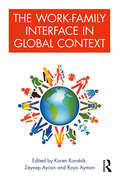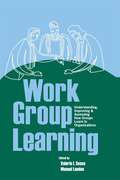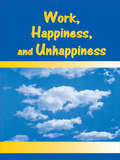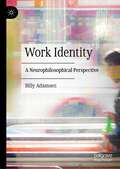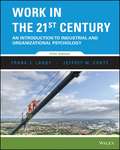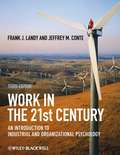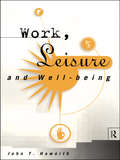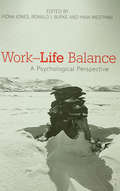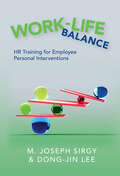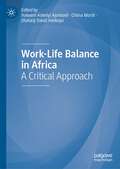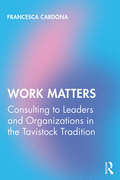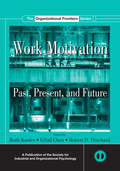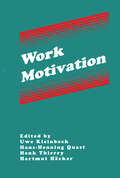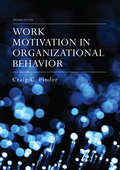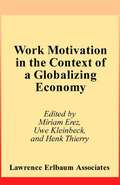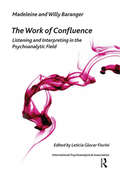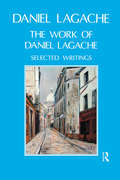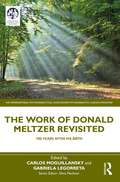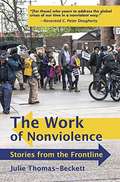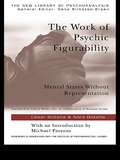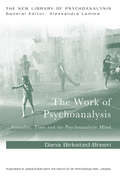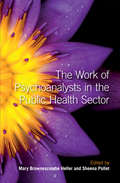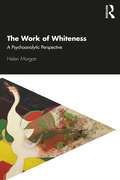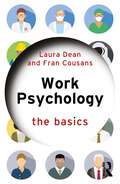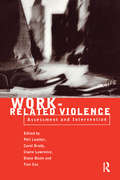- Table View
- List View
The Work-Family Interface in Global Context
by Karen Korabik Zeynep Aycan Roya AymanBased on a sweeping, ten country study, The Work-Family Interface in Global Context comprises the most comprehensive and rigorous cross-cultural study of the work-family interface to date. Just as work-family conflict is associated with negative consequences for workers, organizations, and societies, so too can the work and family domains interact positively to enhance or enrich one another. Drawing on qualitative, quantitative, and policy-based data, chapters in this collection explore the influence of culture on the work-family interface in order to help researchers and managers understand the applicability of work-family models in a variety of contexts and further conceptualize work-family interactions through the development of a more universal knowledge. Members of the Project 3535 Team: Karen Korabik, University of Guelph, Canada.Zeynep Aycan, Koç University, Turkey.Roya Ayman, Illinois Institute of Technology, USA.Artiawati, University of Surabaya, Indonesia.Anne Bardoel, Monash University, Australia.Anat Drach-Zahavy, University of Haifa, Israel.Leslie B. Hammer, Portland State University, USA.Ting-Pang Huang, Soochow University, Taiwan.Donna S. Lero, University of Guelph, Canada.Tripti Pande-Desai, New Delhi Institute of Management, India.Steven Poelmans, EADA Business School, Spain.Ujvala Rajadhyaksha, Governors State University, USA.Anit Somech, University of Haifa, Israel.Li Zhang, Harbin Institute of Technology, China.
Work Group Learning: Understanding, Improving and Assessing How Groups Learn in Organizations
by Valerie Sessa Manuel LondonThis contributed book shapes the emerging field of group learning by drawing on research from leading theoreticians and researchers. Author contributions aggregate existing theory and research and go beyond this foundation to examine new insights about how groups learn and what they learn, factors that influence group learning, learning interventio
Work, Happiness, and Unhappiness
by Peter WarrAward-winning psychologist Peter Warr explores why some people at work are happier or unhappier than others. He evaluates different approaches to the definition and assessment of happiness, and combines environmental and person-based themes to explain differences in people’s experience. A framework of key job characteristics is linked to an account of primary mental processes, and those are set within a summary of demographic, cultural, and occupational patterns. Consequences of happiness or unhappiness for individuals and groups are also reviewed, as is recent literature on unemployment and retirement. Although primarily focusing on job situations, the book shows that processes of happiness are similar across settings of all kinds. It provides a uniquely comprehensive assessment of research published across the world. Initial chapters explore the several meanings of happiness and the ways in which those have been measured by psychologists. The construct includes pleasure, satisfaction and subjective well-being, and unhappiness has been studied in terms of dissatisfaction, strain, anxiety, and depression. The impacts of principal environmental features on these experiences are reviewed through an analogy with vitamins in relation to physical health—beneficial only up to a point. However, environmental effects are not fixed. Influences on happiness from within the person are examined in terms of principal thinking patterns, personality styles, and cultural backgrounds. Differences are explored between groups (men and women, older and younger people, employees who are full-time and part-time, and so on), and processes of person-environment fit are placed within an overall framework which emphasizes the impact of variations in personal salience. The book is written primarily for academic readers, including senior undergraduates, graduate students, teachers, and researchers in fields of Industrial/Organizational Psychology, Management, Human Resources, and Labor Studies. However, the topic's centrality in many professions makes it important also to a wider readership.
Work Identity: A Neurophilosophical Perspective
by Billy AdamsenAt present, 80% of the employees are no longer engaged in their work and capable of performing, while 44% are experiencing work related stress and getting sick from working. A significant increase in time spent on interpretation at work trying to understand what managers and colleagues are saying has been observed too. This book offers a critical view on vocational inventory tests and the development of the work language and the use of it describing work identity. As well as a neurophilosophical perspective on self and work identity, this book provides a plausible neurophilosophical explanation for the negative impact of losing work identity on our work behavior, well-being, and success. Furthermore, the author introduces the innovative Work Identity Pro, the first work identity test to independently measure work identity. It will be of great interest to scholars and students of human resources management, organisation studies and organisational psychology. It will also be of interest to managers and those with an interest in work identity, behaviour and well-being.
Work in the 21st Century: An Introduction to Industrial and Organizational Psychology
by Frank Landy Jeffrey ConteWork in the 21st Century, 5th Edition by Frank J. Landy and Jeffrey M. Conte, ties together themes such as diversity, mental and physical ability, personality, interpersonal skills, emotional intelligence, and evidence-based I-O psychology in a way that explores the rich and intriguing nature of the modern workplace. The 5th edition places an emphasis on the technological and multicultural dynamics of today's workplace. This edition retains the 14-chapter format and the 4-color design, which brings I-O psychology to life, especially with the use of newsworthy color photographs. This text is an unbound, three hole punched version.
Work in the 21st Century: An Introduction to Industrial and Organizational Psychology
by Frank J. Landy Jeffrey M. ConteIn the first two editions of our book, we pursued the premise that the world of work in the 21st century was very different from what it had been as recently as 15 years ago. That premise is even more relevant today and worth repeating. Today's workplace is technological and multicultural.
Work, Leisure and Well-Being
by John T HaworthAlthough it is now well established that unemployment is detrimental to health and well being, most of us assume that a well structured, rewarding leisure activity would be preferable to paid work. John Haworth challenges these assumptions and shows that the very constriction of work, like having to perform a task we wouldn't otherwise choose, are often the most rewarding in the end. Work, Leisure and Well Being reviews the current literature and complements it with the findings of the most recent research to provide a serious and fascinating study of the most important areas of adult life. It raises as many questions as it answers; for instance, if paid work is better than a leisure activity, what's the use of looking forward to retirement? Work, Leisure and Well Being will be of interest not only to psychologists, but also to a wide range of professionals involved in social policy and the leisure industry.
Work-Life Balance: A Psychological Perspective
by Ronald J. Burke Fiona Jones Mina WestmanWhat are the effects of conflict between home and work?Does work stress affect those who live with you? In the rapidly changing modern work environment, time pressures seem ever increasing and new technology allows work to be conducted any time and anywhere. These are just two of the factors that make it more and more difficult for working men and women to integrate work and home life. Consequently, there is a need for flexible and innovative solutions to manage the work-home interface.Work-Life Balance: A Psychological Perspective presents up-to-date information on work-home issues, including the latest research findings. The book’s emphasis is strongly psychological, with a focus on practical solutions, and includes chapters which deal with psychological issues such as the conflict between work and family, how work stresses may affect partners, and recovery from work. It also includes sections on legal issues, as well as examples of initiatives being implemented by leading employers. Contributors are drawn from the leading researchers in their fields and reflect the international character of the current challenges facing employers and employees.Its practical focus and innovative approach make this an essential book for managers, HR professionals and organizational psychologists, as well as students in these disciplines. The theoretical basis and research focus mean the book will also be invaluable for researchers investigating workplace issues.
Work-Life Balance: HR Training for Employee Personal Interventions
by M. Joseph Sirgy Dong-Jin LeeBased on a thorough review of the research on work-life balance, Sirgy and Lee identify a set of personal interventions that selected employees commonly use to increase their work-life balance and life satisfaction. Personal interventions of work-life balance involve five behavior-based strategies and four cognition-based strategies. The behavior-based strategies are engaging in multiple roles and domains, increasing role enrichment, engaging in behavior-based compensation, managing role conflict, and creating role balance. The cognition-based strategies are segmenting roles and domains, integrating roles and domains, engaging in value-based compensation, and applying whole-life perspective in decision-making. This volume provides HR managers and HR consultants with pedagogical material designed to help them develop in-house workshops, seminars, and curricula for their employees to improve their work-life balance by using the personal interventions described in the book.
Work-Life Balance in Africa: A Critical Approach
by Hakeem Adeniyi Ajonbadi Chima Mordi Olatunji David AdekoyaWork-life balance has drawn much attention from academic researchers, professionals, and politicians over the past two decades. However, despite the increased interest globally, there has been an under-representation of academic work on work-life balance across the African continent. So, this book serves as a collection of cases from various contexts across Africa and an exploration of the challenges and how best to manage human resources in this ‘Mother Continent’ with phenomenal potential. The book’s contributions draw on various types of research (conceptual, theoretical and empirical) and incorporate contextual issues such as technology, politics, culture, and economics to supplement the readers’ insights into the varying work-life balance experiences in African countries. By highlighting theoretical underpinnings and emphasising the practical relevance of issues related to managing work and non-work commitments, this book will offer an insightful guide for students and scholars interested in Business Management, Human Resource Management, Sociology of Work, and Industrial and Organisational Psychology in developing economies.
Work Matters: Consulting to leaders and organizations in the Tavistock tradition
by Francesca CardonaWork is complicated: It can be fulfilling and exciting, or disappointing and disruptive. We spend most of our adult lives at work; it shapes our identities and provides a context for our creativity and talents. It can be the source of great pleasure – and of profound distress. In Work Matters, organizational consultant and Tavistock lecturer Francesca Cardona examines our changing relationship with work today. Drawing on case studies from a wide range of individuals and organizations, she considers the dynamics at play in our working lives. Cardona examines how to navigate times of transition, and the balance of power in the work place, while also addressing latent issues such as the effects of shame, the cost of ill-conceived organizational structures and tasks, the interface between the personal and the professional, and the manager’s most precious skill: the ability to be psychologically present. Finally, Cardona casts an eye on the consultant’s role in helping organizations move forwards in ways that are professionally and personally rewarding. Whether you are a business leader, manager, consultant or student, or simply interested in how your work affects you, Work Matters offers essential insights into an area that occupies so much of our lives.
Work Motivation: Past, Present and Future (Siop Organizational Frontiers Ser.)
by Ruth Kanfer Gilad Chen Robert D. PritchardThis edited volume in SIOP's Organizational Frontiers Series presents the current thinking and research on the important area of motivation.Work Motivation is a central issue in Industrial organizational psychology, human resource management and organizational behavior. In this volume the editors and authors show that motivation must be seen as a m
Work Motivation (Applied Psychology Series)
by Uwe Kleinbeck Hans-Henning Quast Henk Thierry Hartmut HA unique compendium of international investigations into motivation and performance, this book offers chapters by industrial and organizational psychologists from the United States, Europe, Australia, and Japan as they share their theories, concepts, empirical evidence, and practical evidence regarding the subject. The volume focuses on three distinct themes: * the relationship between motivation and performance * practical examples of building and strengthening the motivating potential with particular attention paid to productivity and the health of the employees * the development of work motivation over time and the change of the relative importance of central variables Work Motivation provides an exceptional blend of modern theoretical approaches, technologically sound techniques for solving practical problems, and empirical results to prove theoretical and technical validities.
Work Motivation in Organizational Behavior: Theory, Issues And Applications (Scott, Foresman Series In Organizational Behavior And Human Resources Ser.)
by Craig C. PinderThis second edition of the best-selling textbook on Work Motivation in Organizational Behavior provides an update of the critical analysis of the scientific literature on this topic, and provides a highly integrated treatment of leading theories, including their historical roots and progression over the years. A heavy emphasis is placed on the notion that behavior in the workplace is determined by a mix of factors, many of which are not treated in texts on work motivation (such as frustration and violence, power, love, and sex). Examples from current and recent media events are numerous, and intended to illustrate concepts and issues related to work motivation, emotion, attitudes, and behavior.
Work Motivation in the Context of A Globalizing Economy
by Miriam Erez, Uwe Kleinbeck and Henk ThierryWork Motivation in the Context of a Globalizing Economy evolved from a work motivation conference held in Israel, attended by a group of internationally renowned scholars. These scholars were given the charge of creating a vision of motivation research for the 21st century. Coming from different parts of the world, the scholars represent a wide range of perspectives from the very micro focus on the individual level of motivation, through the meso level of groups and organizations, and up to the macro level of culture. The authors provide an entry to the book by summarizing several mega-trends manifest across all of the chapters and identifying several emerging trends that are left for future research.
The Work of Confluence: Listening and Interpreting in the Psychoanalytic Field (The International Psychoanalytical Association Psychoanalytic Ideas and Applications Series)
by Madeleine Baranger Willy BarangerThis book expands the authors' oeuvre to the English language and, consequently, to a broader spectrum of readers. These contributions represent a pioneering work of great interest to the field of psychoanalysis. Their proposals concerning the concept of psychoanalytic field, "basic unconscious fantasy", bastion and insight, address the whole question of the analytic situation and anticipate current debates.
The Work of Daniel Lagache: Selected Papers 1938-1964
by Daniel LagacheIn 1947, the author founded the Library of Psychoanalysis and Clinical Psychology at Presses Universitaires de France, and forty-two volumes have appeared, by French and foreign authors, nine of them works or reprints of articles by Freud. It was here that he produced his precise and important The Language of Psychoanalysis (1968), which has been translated into many languages. The Works of Daniel Lagache English edition in one volume is a selection of those texts that are most representative of the psychoanalytic thinking of the author. It is a thinking that is rich in epistemology, ensuring that psychoanalysis is set in relationship to behaviorism and clarifies its status as an "exact science". It deserves to provoke a lively response from the English speaking public.
The Work of Donald Meltzer Revisited: 100 Years After His Birth (The International Psychoanalytical Association Psychoanalytic Classics Revisited)
by Carlos Moguillansky Gabriela LegorretaThe Work of Donald Meltzer Revisited: 100 Years After His Birth returns to and reassesses the contributions of Donald Meltzer, one of the most significant disciples of Melanie Klein and who was deeply inspired by Wilfred Bion.
The Work of Nonviolence: Stories from the Frontline
by Julie Thomas-BeckettThe Work of Nonviolence describes the tactics used on various domestic and international peace teams and provides tools for everyday people to de-escalate tensions.
The Work of Psychic Figurability: Mental States Without Representation (The New Library of Psychoanalysis)
by Sára Botella César BotellaThe majority of psychoanalysts today agree that the analytic setting faces them daily with certain aspects of their work for which the answers provided by an analytic theory centred exclusively on the notion of representation prove insufficient. On the basis of their experience of analytic practice and illustrated by fascinating clinical material, César and Sára Botella set out to address what they call the work of figurability as a way of outlining the passage from the unrepresentable to the representational. They develop a conception of psychic functioning, which is essentially grounded in the inseparability of the negative, trauma, and the emergence of intelligibility, and describe the analyst's work of figurability arising from the formal regression of his thinking during the session, which proves to be the best and perhaps the only means of access to this state beyond the mnemic trace which is memory without recollection. The Work of Psychic Figurability argues that taking this work into consideration at the heart of the theory of practice is indispensable. Without this, the analytic process is too often in danger of slipping into interminable analyses, into negative therapeutic reactions, or indeed, into disappointing successive analyses.
The Work of Psychoanalysis: Sexuality, Time and the Psychoanalytic Mind (New Library of Psychoanalysis)
by Dana Birksted-BreenPsychoanalysts working in clinical situations are constantly confronted with the struggle between conservative forces and those which enable something new to develop. Continuity and change, stasis and transformation, are the major themes discussed in The Work of Psychoanalysis, and address the fundamental question: How does and how can change take place? The Work of Psychoanalysis explores the underlying coherence of the complex linked issues of theory and practice. Drawing on clinical cases from her own experience in the consulting room Dana Birksted-Breen focuses on what takes place between patient and analyst, giving a picture of the interlocking and overlapping vertices that make up the work needed in psychoanalysis. Some of the key topics covered include: sexuality; aspects of female identity; eating disorders; time; dreams; disturbances in modalities of thought; and terminating psychoanalysis. This book draws different traditions into a coherent theoretical position with consequences for the mode of working analytically. The Work of Psychoanalysis will appeal to psychoanalysts and academics in psychoanalysis, psychotherapists, as well as postgraduate students studying courses in these fields.
The Work of Psychoanalysts in the Public Health Sector
by Sheena Pollet Mary HellerThis book provides a comprehensive insight into the ways in which psychoanalysts think and work. Mary Brownescombe Heller and Sheena Pollet bring together internationally known contributors trained at the Institute of Psychoanalysis to explore the broad range of clinical work, thinking, and teaching undertaken with children, families, adults and staff by psychoanalysts in the UK public health sector. Divided into four sections, The Work of Psychoanalysts in the Public Health Sector covers: clinical work with parents and young children, clinical work with adults and their families, analytic thinking in health service practice analytic support for health service staff. Experienced psychoanalysts discuss work with various client groups including parents with babies, children, adolescents who self harm, and adults with serious mental health conditions and psychosis. The book also explores how psychoanalytically-informed work can be used alongside other treatment methods, and how health service staff can best be trained and supported. The Work of Psychoanalysts in the Public Health Sector offers the reader a broad perspective and a clear understanding of the various analytical concepts used in clinical practice. It will be invaluable reading for anyone interested in, or already using psychoanalytic ideas and techniques in the health sector, as well as students in training.
The Work of Whiteness: A Psychoanalytic Perspective
by Helen Morgan‘Whiteness’ is a politically constructed category which needs to be understood and dismantled because the system of racism so embedded within our society harms us all. It has profound implications for human psychology, an understanding of which is essential for supporting the movement for change. This book explores these implications from a psychoanalytic and Jungian analytic perspective. The ‘fragility’ of whiteness, the colour-blind approach and the silencing process of disavowal as they develop in the childhood of white liberal families are considered as means of maintaining white privilege and racism. A critique of the colonial roots of psychoanalytic theories of Freud and Jung leads to questioning the de-linking of the individual from society in modern day analytic thinking. The concept of the cultural complex is suggested as a useful means of connecting the individual and the social. Examples from the author’s clinical practice as well as from public life are used to illustrate the argument. Relatively few black people join the psychoanalytic profession and those who do describe training and membership as a difficult and painful process. How racism operates in clinical work, supervision and our institutions is explored, and whilst it can seem an intractable problem, proposals are given for ways forward. This book will be of great importance to psychoanalysts, psychotherapists, social workers and all those with an interest in the role of white privilege on mental health.
Work Psychology: The Basics (The Basics)
by Laura Dean Fran CousansWork Psychology: The Basics provides an accessible, jargon-free introduction to the fundamental principles of work and occupational psychology. Covering key theories and models in this dynamic area, it offers a solid understanding of both academic theory and practical applications. The book follows the structure of the British Psychological Society curriculum for Masters courses, exploring psychological assessment at work, learning, training and development; wellbeing at work, work design, organisational change and development, and leadership, engagement and motivation. These core topics are supplemented by deep dives into the development of the discipline, research and practice in the field, and suggestions for the future of work psychology. Giving a detailed look into the world of work, it answers questions such as: Can we accurately select people for jobs? How can work positively and negatively affect mental and physical health? How can we motivate people in the workplace? What makes a good leader? It also explores issues around types of research and what effective research looks like in this area. Supported by a helpful guide on the routes to chartership in the UK and working in the area, as well as a glossary of key terms and suggestions for further reading, this is the ideal introductory text for students. It will also interest those looking to understand the subject more generally and complete training in the area.
Work-Related Violence: Assessment And Intervention
by Phil LeatherRecent reports suggest that violence in the workplace is an increasingly common problem for organizations, and that violence -or the threat of it- is one of the major sources of stress at work. Work-Related Violence examines the causes and consequences of violence at work, and offers practical solutions for managers and organizational psychology professionals. Part one reviews the size and scope of the problem and sets out the need for intervention and policy. Part two provides case studies of organizations and settings in which such an approach has been applied.
